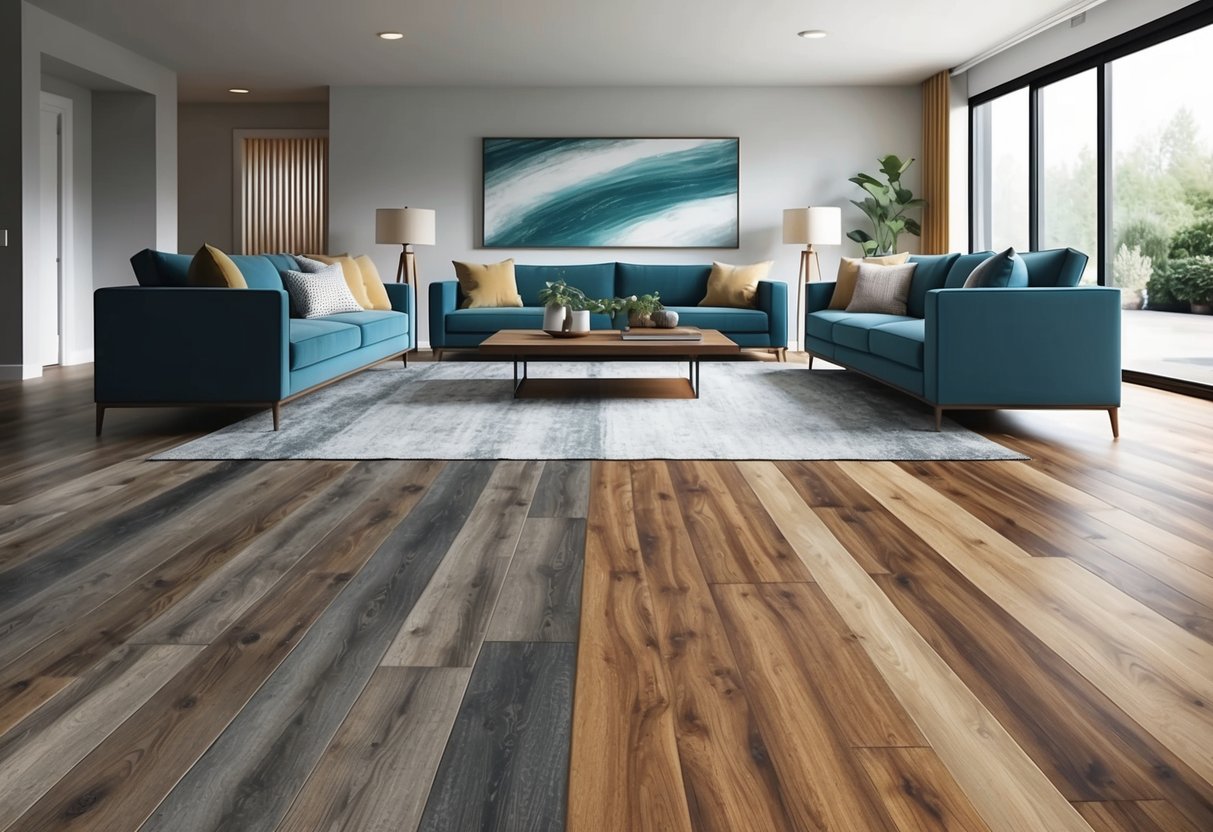
Finish Options
Hardwood flooring offers a choice between prefinished and site-finished options. Prefinished boards come with factory-applied finishes that are highly durable, such as aluminum oxide or UV-cured urethane.
Site-finished wood allows custom stain selection and sheen adjustment, with popular finishes ranging from matte to high-gloss. Finish can impact the look and lifespan of the floor and is sometimes tailored to specific wood species.
Luxury vinyl plank does not require staining or finishing after installation. Factory finishes, typically made of urethane or enhanced wear layers, deliver long-lasting protection and consistent color.
While LVP’s finish is generally maintenance-free, it is designed with a fixed sheen—often matte or low-gloss—to mirror contemporary or rustic wood flooring trends. The main benefit is that homeowners do not need to refinish or reseal the planks, and the look remains consistent from room to room.
For more on visual options, see this guide on hardwood and vinyl plank aesthetics.
Durability and Longevity
When comparing luxury vinyl plank and hardwood flooring, homeowners often look closely at lifespan, resistance to scratches, and how well each surface stands up under frequent use. Choosing durable flooring depends on expectations for refinishing, susceptibility to damage, and performance in busy environments.
Longevity Expectations
Hardwood floors, especially solid hardwood, are known for their impressive lifespan, easily lasting 30 years or more. Their ability to be sanded and refinished multiple times is a major advantage, often allowing homeowners to refresh their appearance or repair surface damage over decades.
This process can significantly extend the usability of solid hardwood and engineered hardwood alike. For long-term value, hardwood tends to stand out, as it can increase resale value and maintain a classic appearance for generations.
In comparison, luxury vinyl plank (LVP) typically has a shorter life expectancy. Most LVP products last about 15-25 years depending on the quality of the material and how well they are maintained.
While LVP cannot be refinished, it resists damage that might otherwise shorten its life. As a result, it stays looking newer for longer periods in less harsh conditions but will eventually need replacement once its wear layer is compromised.
For more on the difference in lifespan see how lifespans compare at Christoff & Sons.
Scratch Resistance and Wear
Hardwood is strong but not immune to scratches, dents, or scuffs, especially from moving furniture, pet claws, or sharp objects. Softer wood species show damage more easily, whereas harder types like oak or maple offer greater durability, but are still susceptible in high-traffic homes.
Engineered hardwood shares similar properties because its top veneer is natural wood, and surface scratches can accumulate over time. Luxury vinyl plank flooring stands out as highly scratch-resistant, making it a better choice for households with pets or young children.
Its tough wear layer helps protect against everyday damage, such as dragging chairs or dropped items. However, deep gouges or stains are still possible and, unlike hardwood, LVP cannot be repaired by refinishing.
Instead, the damaged plank typically needs replacing.
High-Traffic Areas
In spaces like entryways, kitchens, and hallways, the performance of flooring under constant use becomes crucial. Luxury vinyl plank generally surpasses hardwood in these high-traffic areas due to its resilience against scratches, dents, and stains.
Its waterproof finish also means spills and moisture are less of a concern, making LVP a practical choice in busy homes or homes with children. Hardwood, while durable, tends to show wear patterns and scratches over time, particularly in the busiest parts of a home.
It is not ideal for kitchens or mudrooms where water or heavy impacts are frequent. Regular care and refinishing can help restore hardwood’s surface, but this adds to long-term maintenance.
For more insights, read about LVP’s performance in active households at Oshkosh Designs.
Water Resistance and Moisture Tolerance
Water is a major factor when selecting between luxury vinyl plank and hardwood flooring. Both flooring types perform very differently in rooms where spills, humidity, or moisture are common.
Water Resistance in Luxury Vinyl Plank
Luxury vinyl plank (LVP) is designed with water resistance as a key feature. It is manufactured from synthetic materials that do not absorb water, making it ideal for moisture-prone areas like kitchens, bathrooms, and laundry rooms.
LVP remains unaffected by spills, splashes, and even standing water for extended periods. This type of flooring is impervious to staining and water damage, so warping, swelling, or mold is rarely a concern.
Busy families and pet owners favor LVP because cleaning is as simple as wiping up liquids without worrying about lasting harm. In high-traffic spaces, LVP offers durability alongside its water-resistant qualities, making it a popular choice for homes that need reliable protection against daily messes.
If you have a basement or are concerned about structural changes from humidity, the moisture-proof nature of LVP adds valuable peace of mind. For a more detailed discussion on its moisture defense, see this guide to LVP’s exceptional water tolerance.
Moisture Considerations for Hardwood
Solid hardwood and engineered hardwood flooring lack inherent water resistance. Exposure to moisture can cause hardwood planks to warp, swell, or even rot over time.
Even minor spills must be wiped up quickly to prevent permanent damage. Prolonged humidity or repeated moisture exposure can lead to gapping or cupping, particularly with solid hardwood.
In areas where water is a frequent concern—such as bathrooms or below-grade basements—wood flooring is generally not recommended. Installing hardwood requires extra steps, such as vapor barriers and acclimatization, to help reduce moisture-related problems.
Routine maintenance and climate control become essential for hardwood flooring longevity, especially in regions with high humidity or temperature swings. Learn more about the challenges and care required for hardwood flooring in wet environments.